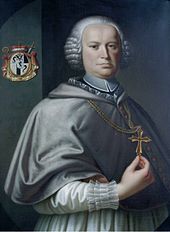Johannes Baptist Anton von Federspiel
Johann Baptist Anton von Federspiel (born October 23, 1708 at Fürstenburg Castle in Vinschgau ; † February 27, 1777 in Chur ) was the Roman Catholic bishop of the diocese of Chur .
family
Servants and servants in the Bündner Land are said to have been the Federspiel. Heinrich von Väderspill is named in a document in Disentis Abbey in 1283. There is no evidence of the family, as the Domat church records were destroyed by fire in 1776. Pankraz Federspiel, Landammann (mayor) of the rule Rhäzüns was the father of Johann Federspiel and grandfather of Ulrich Federspiel, whose brother was Luzius Rudolf Federspiel Freiherr zu Lichtenegg in times at Merano . His son Johann Baptist Anton Federspiel was Prince-Bishop of Chur from 1755 to 1777. In the middle of the 19th century, the baronial line died out in the male line.
Life
Johann Baptist Anton was the eldest son of the episcopal castellan and castle captain Luzius Rudolf von Federspiel, from Domat / Ems and his wife Maria Anna Elisabeth Freiin von Rost, sister of Bishop Joseph Benedikt von Rost . His paternal uncle was Bishop Ulrich von Federspiel .
He attended the convent school of the Benedictine - Marienberg Abbey , went in 1724 to Innsbruck , 1726 at the University of Dillingen on the Danube and studied from 1727 to 1731 theology at the collegium germanicum et hungaricum in Rome . He was ordained a priest on July 22, 1731 . As early as 1724 he was canon at Chur Cathedral, in 1739 cathedral cantor and in 1743 cathedral dean .
On February 3, 1755, he was elected Bishop of Chur to succeed his uncle Josef Benedikt von Rost, who died on November 12, 1754. Since the new bishop of Chur, like his predecessors, did not take the oath on the "Six Articles" of August 6, 1541 (including the status quo in matters of faith, bishops only from the ranks of the Church of God Federation ), the Church of God Federation refused to recognize him. Pope Benedict XIV confirmed the election on July 21, 1755. He was consecrated as a bishop on September 14, 1755 in the Brixen Cathedral by the Bishop of Brixen Leopold Maria Joseph von Spaur . On March 23, 1757 he received the imperial regalia from Emperor Franz I Stephan with the title "Spiritual Prince ".
Bishop Johann Anton von Federspiel also felt the enlightenment tendency of the state to intervene in church matters. He protested against the introduction of the new catechism of the founder of biblical history lessons and school reformer Benedict Strauch . He opposed the demand of 1755, according to which the filling of new pastoral posts should be determined by a sovereign commissioner, and the special taxation of the clergy. He was only partially successful with his protests and refusals; in Tyrol and Liechtenstein he had to accept state control of the church system.
He intended to set up a Jesuit college in Chur , but this project failed due to the repeal of the Jesuit order by Pope Clement XIV in 1773. He did not succeed in maintaining the premises of the college in Feldkirch as a diocesan seminary. The free places at the University of Dillingen, however, were saved for students from the Chur diocese. He also managed to improve relations with the Church of God and the city of Chur. He was also considered a promoter of the Sacred Heart of Jesus in his diocese.
Bishop Johann Baptist Anton von Federspiel, who died on February 27, 1777 as a result of a stroke , was buried in the bishop's grave in the south aisle of the Cathedral of the Assumption of Mary in Chur.
literature
- Pierre Surchat: Federspiel, Johann Baptist Anton von. In: Historical Lexicon of Switzerland .
- Erwin Gatz (ed.), With the assistance of Stephan M. Janker: The Bishops of the Holy Roman Empire 1648 to 1803. A biographical lexicon. Duncker & Humblot, Berlin 1990, ISBN 3-428-06763-0 , p. 104 f.
Web links
- Entry on Johannes Baptist Anton von Federspiel on catholic-hierarchy.org ; accessed on November 15, 2016.
- The portraits of the Chur (prince) bishops in the knight's hall of the Episcopal Palace in Chur - Johann Baptist Anton Freiherr von Federspiel 1755–1777 ( Memento from November 11, 2013 in the Internet Archive )
Individual evidence
- ^ Roman Bühler: Federspiel. In: Historical Lexicon of Switzerland .
- ^ The bishops of the German-speaking countries.
- ^ Albert Fischer: Johann Baptist Anton Freiherr von Federspiel 1755-1777.
| predecessor | Office | successor |
|---|---|---|
| Joseph Benedikt Freiherr von Rost |
Bishop of Chur 1755–1777 |
Franz Dionysius Freiherr von Rost |
| personal data | |
|---|---|
| SURNAME | Federspiel, Johannes Baptist Anton von |
| ALTERNATIVE NAMES | Federspiel, Johann Baptist Anton Freiherr von |
| BRIEF DESCRIPTION | Bishop of Chur |
| DATE OF BIRTH | October 23, 1708 |
| PLACE OF BIRTH | Fürstenburg Castle , Vinschgau |
| DATE OF DEATH | February 27, 1777 |
| Place of death | Chur |

